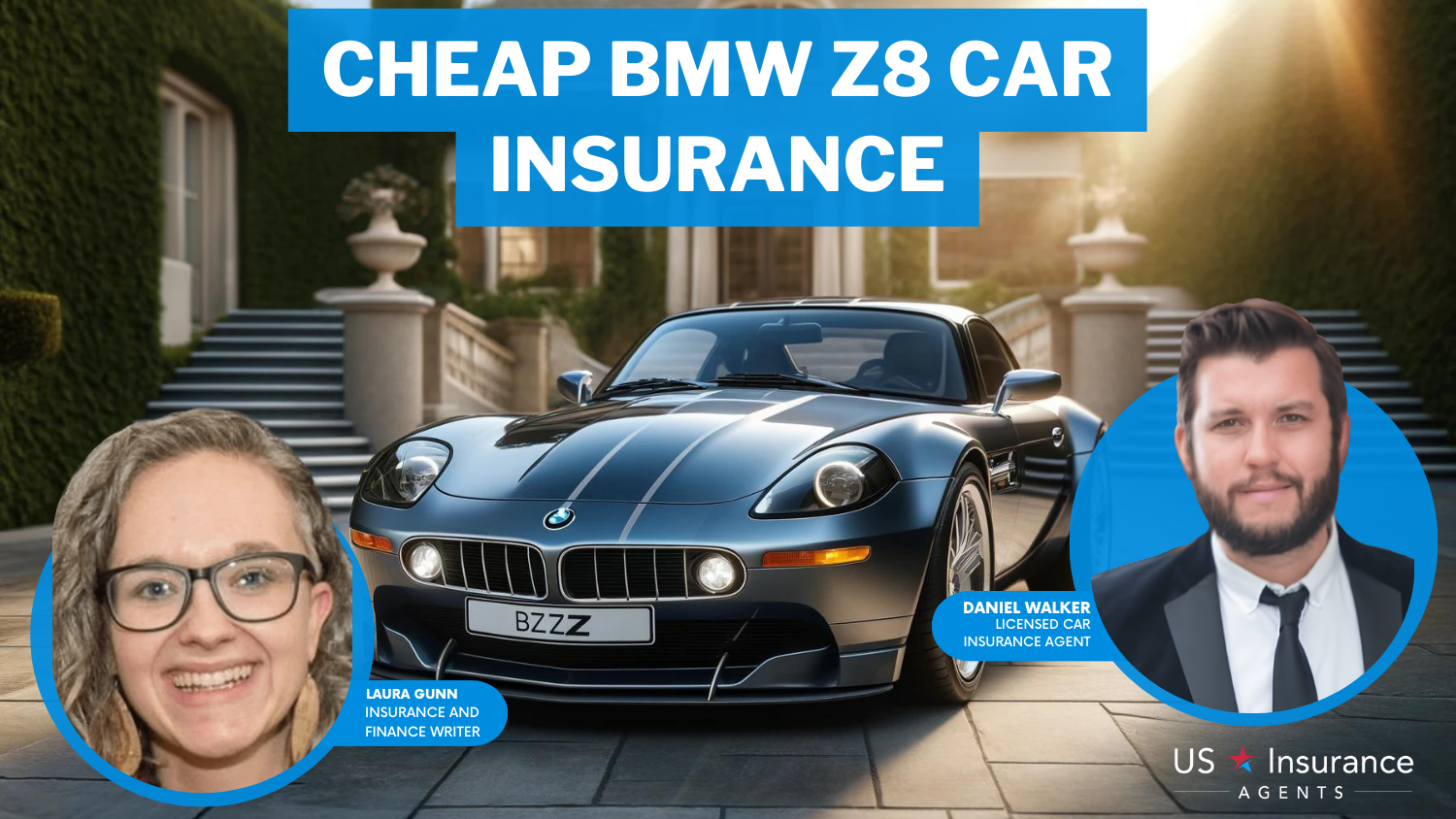Does my car insurance cover damage caused by a deer or other wildlife?
Understanding Your Auto Insurance: Exploring Whether Your Policy Covers Damage Caused by Deer or Other Wildlife Encounters
Read more Secured with SHA-256 Encryption





Table of Contents
Table of Contents


Licensed Insurance Agent
Travis Thompson has been a licensed insurance agent for nearly five years. After obtaining his life and health insurance licenses, he began working for Symmetry Financial Group as a State Licensed Field Underwriter. In this position, he learned the coverage options and limits surrounding mortgage protection. He advised clients on the coverage needed to protect them in the event of a death, critica...
Travis Thompson


Sr. Director of Content
Sara Routhier, Senior Director of Content, has professional experience as an educator, SEO specialist, and content marketer. She has over 10 years of experience in the insurance industry. As a researcher, data nerd, writer, and editor, she strives to curate educational, enlightening articles that provide you with the must-know facts and best-kept secrets within the overwhelming world of insurance....
Sara Routhier


Insurance & Finance Analyst
Laura Adams is one of the nation’s leading finance, insurance, and small business authorities. As an award-winning author, spokesperson, and host of the top-rated Money Girl podcast since 2008, millions of readers and listeners benefit from her practical advice. Her mission is to empower consumers to live healthy and rich lives by planning for the future and making smart money decisions. She rec...
Laura D. Adams
Updated January 2025
Car accidents involving wildlife can be a common occurrence, especially in areas with high populations of deer or other animals. These accidents can result in significant damage to your vehicle and potentially leave you facing expensive repair bills. So, it’s important to understand if your car insurance policy covers damage caused by a deer or other wildlife.
Understanding Your Car Insurance Policy
Before we dive into the specifics of coverage for wildlife-related accidents, it is essential to have a basic understanding of your car insurance policy. Car insurance typically consists of several types of coverage, including liability, comprehensive, and collision coverage. Let’s take a closer look at each of these coverages and how they protect you and your vehicle.
Liability Coverage
Liability insurance is required in most states and covers damage to other people’s property. This coverage helps pay for repairs or replacement of another person’s vehicle or property if you are at fault in an accident. It also provides financial protection if you cause injuries to someone else in a car accident and they file a claim against you.
Comprehensive Coverage
Comprehensive coverage is designed to cover non-collision-related incidents, such as theft, vandalism, and, yes, damage caused by wildlife. It provides financial protection for repairs or replacement of your vehicle if it’s damaged by an animal, like a deer. This coverage also extends to other types of damage, such as fire, hail, falling objects, and natural disasters.
For example, if you accidentally hit a deer while driving, comprehensive coverage would help cover the cost of repairing your vehicle. It’s important to note that comprehensive coverage is typically optional, but it can provide valuable protection for unexpected events that are beyond your control.
The Role of Collision Coverage
Collision coverage, on the other hand, covers damage to your vehicle in the event of a collision with another vehicle or object, such as a tree or guardrail. While comprehensive coverage would typically apply to wildlife-related accidents, collision coverage may come into play if you swerve to avoid a deer and hit another vehicle or object.
For instance, if you encounter a deer on the road and swerve to avoid it but end up colliding with a tree, your collision coverage would help cover the cost of repairing your vehicle. This coverage is also optional, but it can be beneficial if you want additional protection for accidents involving your vehicle.
It’s important to review your car insurance policy carefully to understand the specific coverage limits and deductibles associated with each type of coverage. Additionally, keep in mind that certain factors, such as your driving history, the make and model of your vehicle, and your location, can affect your insurance rates and coverage options.
By having a comprehensive understanding of your car insurance policy, you can make informed decisions about the coverage you need to protect yourself and your vehicle. Remember to consult with your insurance provider or agent to clarify any questions or concerns you may have regarding your policy.
Free Auto Insurance Comparison
Compare Quotes From Top Companies and Save
Secured with SHA-256 Encryption
Wildlife-Related Car Accidents: A Closer Look
When it comes to wildlife-related car accidents, deer are often the animals we encounter most frequently. However, other animals, such as birds, rodents, or even larger animals like bears or moose, can also cause accidents. Let’s explore some common types of wildlife-related accidents and their potential consequences.
Wildlife-related car accidents can happen to anyone, regardless of where they live. Whether you’re driving through a rural area known for its deer population or navigating the busy streets of a suburban neighborhood, the risk of encountering wildlife on the road is always present.
One of the most common scenarios involving wildlife is a deer darting out onto the road, giving drivers little time to react. The sudden appearance of a deer can startle even the most experienced driver, causing panic and potentially leading to a collision. Swerving to avoid the deer may result in a collision with another vehicle or object, causing significant damage. In other cases, the impact with the animal itself can cause damage to your vehicle.
Accidents involving smaller animals, like birds or rodents, may not cause as much damage, but they can still result in broken windshields or damage to the exterior of your vehicle. Imagine driving down a quiet suburban street when a flock of birds suddenly takes flight, colliding with your windshield. The sound of the impact is startling, and you’re left with a cracked windshield as a reminder of the encounter.
Collisions with larger animals, such as bears or moose, are especially dangerous and can lead to severe injuries and extensive vehicle damage. Picture yourself driving through a scenic mountain road, surrounded by towering trees and breathtaking views. Suddenly, a massive moose appears on the road ahead. Its sheer size and strength are intimidating, and you have no choice but to come to a screeching halt. The impact of hitting such a large animal can be catastrophic, causing not only damage to your vehicle but also posing a significant risk to your safety.
Statistics on Wildlife-Related Car Accidents
According to data from the National Highway Traffic Safety Administration (NHTSA), wildlife-related car accidents are more common than you might think. Each year, there are approximately 1.5 million reported collisions with deer alone in the United States. These accidents result in thousands of injuries and hundreds of fatalities.
It’s worth noting that wildlife-related accidents are not limited to rural areas. In fact, many accidents occur in suburban or urban areas where wildlife populations overlap with human settlements. As urbanization continues to encroach upon natural habitats, the chances of encountering wildlife on the road increase.
When it comes to wildlife-related car accidents, prevention is key. Being aware of your surroundings, especially in areas known for wildlife activity, can help you anticipate potential encounters and react accordingly. Additionally, maintaining a safe driving speed and using your headlights effectively can improve your chances of avoiding collisions with animals.
Understanding how your insurance coverage applies to wildlife-related accidents is also essential. Some insurance policies may offer specific coverage for collisions with animals, while others may require additional coverage options. Reviewing your policy and discussing it with your insurance provider can help ensure you are adequately protected.
Remember, when driving in areas with wildlife, it’s crucial to exercise caution and respect for the animals that share our environment. By being mindful of their presence and taking necessary precautions, we can reduce the risk of wildlife-related car accidents and protect both ourselves and the wildlife around us.
Does Car Insurance Cover Deer Accidents?
Now, let’s address the specific question of whether car insurance covers accidents involving deer. The answer generally depends on the type of coverage you have.
But before we delve into the details, let’s take a moment to appreciate the majesty of these graceful creatures. Deer are known for their slender bodies, elegant movements, and magnificent antlers. Found in various parts of the world, they are a symbol of grace and beauty in the animal kingdom.
How Insurance Companies Handle Deer Accidents
Most insurance policies that include comprehensive coverage will cover deer accidents. If you have comprehensive coverage, the damage to your vehicle caused by hitting a deer should be covered, subject to your policy’s deductible.
Comprehensive coverage is like a safety net for unexpected events. It protects you from a range of perils, including animal collisions, theft, vandalism, and natural disasters. So, if you find yourself face-to-face with a deer on the road, you can rest assured knowing that your comprehensive coverage has your back.
It’s crucial to review your policy documents or contact your insurance provider directly to confirm the specifics of your coverage. They can provide you with the necessary information and answer any questions you may have.
However, if you only have liability coverage or basic collision coverage, neither would typically cover damage caused by a deer or other wildlife. Liability coverage is primarily designed to protect you financially if you cause an accident that injures someone else or damages their property.
So, while liability coverage is essential, it may not offer the same level of protection when it comes to deer accidents. Basic collision coverage, on the other hand, focuses on covering the cost of repairs to your vehicle when you collide with another vehicle or object.
Filing a Claim for a Deer Accident
If you find yourself involved in a deer accident, follow these steps to ensure a smooth claims process:
- Document the damage: Take photos of the damage caused by the accident, including both your vehicle and any visible signs of the animal involved. These photos can serve as evidence and help your insurance provider assess the extent of the damage.
- Report the accident: Contact your insurance provider as soon as possible to report the accident and initiate the claims process. They understand the stress and confusion that can accompany such incidents, and they will guide you through the necessary steps. Remember, prompt reporting is crucial to ensure a timely resolution of your claim.
- Provide details: When filing a claim, be prepared to provide specific details about the accident, such as the location, date, time, and any relevant police or incident report numbers. These details help paint a clear picture of the incident and assist the claims adjuster in their investigation.
- Get an estimate: Your insurance provider may require an estimate from a certified mechanic or repair shop to assess the cost of repairs. Obtain an estimate from a reputable repair facility. This estimate will help determine the amount of coverage you are eligible for.
- Paying the deductible: In most cases, you’ll be responsible for paying the deductible specified in your policy before your insurance covers the remaining repair costs. The deductible is the amount you agree to contribute towards the claim. It’s important to review your policy to understand your deductible and its impact on your claim.
- Repair or replace: Depending on the extent of the damage, you may have the option to repair or replace your vehicle. Your insurance provider will work with you to determine the best course of action. They will consider factors such as the cost of repairs, the value of your vehicle, and the potential for future issues due to the accident.
Deer accidents can be stressful and unexpected, but with the right coverage and a clear understanding of the claims process, you can navigate the situation with confidence. Remember, your insurance provider is there to support you and help you get back on the road as quickly as possible.
So, the next time you encounter a deer on the road, take a moment to appreciate their beauty, but also ensure you have the appropriate insurance coverage to protect yourself and your vehicle.
Coverage for Other Types of Wildlife Accidents
While deer are the most commonly involved animals in wildlife-related accidents, it’s essential to understand that coverage for other types of wildlife accidents may vary. Let’s explore some scenarios you might encounter.
Accidents Involving Birds, Rodents, and Other Small Animals
Damage caused by birds, rodents, or other small animals may be covered under comprehensive coverage, depending on your policy. For example, if a bird hits your windshield and cracks it or a rodent damages your vehicle’s wiring, comprehensive coverage would likely apply. Keep in mind that comprehensive coverage typically carries a deductible, which you would be responsible for paying.
Large Animal Accidents: Bears, Moose, and More
Collisions with larger animals, such as bears, moose, or other wildlife, can cause significant damage and pose a higher risk of injury. Comprehensive coverage usually extends to these types of accidents as well. However, it’s crucial to consult your policy or speak to your insurance provider for precise details about how coverage applies to larger animal accidents.
Free Auto Insurance Comparison
Compare Quotes From Top Companies and Save
Secured with SHA-256 Encryption
What to Do After a Wildlife-Related Car Accident
If you find yourself involved in a wildlife-related car accident, it’s important to take immediate steps to ensure your safety and protect your interests.
Immediate Steps to Take at the Scene
1. Move to a safe location: If possible, move your vehicle to a safe spot off the road and turn on your hazard lights.
2. Check for injuries: Assess yourself and any passengers in your vehicle for injuries. If anyone requires medical attention, call emergency services immediately.
3. Contact local authorities: Report the accident to the local police or wildlife authorities, especially if the animal is injured or poses an ongoing risk to other drivers.
4. Document the scene: Take photos or videos of the accident scene, including any damage to your vehicle and the surrounding area.
Reporting the Accident to Your Insurance Company
Once you have taken the necessary steps to ensure immediate safety, it’s crucial to report the accident to your insurance company as soon as possible. By reporting the accident promptly, you can start the claims process and receive guidance on the next steps specific to your policy and coverage.
Remember, it’s always a good idea to review your car insurance policy to understand the coverage it offers for wildlife-related accidents. If you have any questions or concerns, don’t hesitate to reach out to your insurance provider for clarification. By doing so, you can ensure proper protection in the event of a wildlife-related car accident.
While you’re reviewing your car insurance policy, why not take a few minutes to compare quotes from different insurance companies? Using our free tool, you can quickly and easily review insurance rates online, saving both time and money. It’s always wise to explore all your options and find the best coverage at the most competitive rates.
Frequently Asked Questions
Does car insurance cover damage caused by hitting a deer or other wildlife?
Yes, most car insurance policies provide coverage for damage caused by hitting a deer or other wildlife. This coverage is typically included under the comprehensive coverage portion of your policy.
What does comprehensive car insurance cover?
Comprehensive car insurance covers damage to your vehicle that is not caused by a collision with another vehicle. This includes damage from hitting a deer or other wildlife, as well as damage from theft, vandalism, fire, natural disasters, and falling objects.
Will my car insurance cover damage if I swerve to avoid hitting a deer?
If you swerve to avoid hitting a deer and end up causing damage to your vehicle, your car insurance may still cover the damage. However, it’s important to check the specific terms and conditions of your policy, as coverage can vary.
Do I need to pay a deductible for car insurance claims related to hitting a deer?
In most cases, you will need to pay a deductible for car insurance claims related to hitting a deer or other wildlife. The deductible is the amount you are responsible for paying before your insurance coverage kicks in. The specific deductible amount will depend on your policy.
Will my car insurance rates increase if I make a claim for deer-related damage?
It is possible that your car insurance rates may increase if you make a claim for deer-related damage. Insurance companies consider various factors when determining rates, including your claims history. It’s recommended to check with your insurance provider to understand the potential impact on your rates.
What should I do if I hit a deer with my car?
If you hit a deer with your car, it’s important to prioritize your safety and the safety of others. Move your vehicle to a safe location, turn on hazard lights, and assess any injuries. Contact the authorities if necessary. Additionally, report the incident to your insurance company to initiate the claims process.
Get a FREE Quote in Minutes
Insurance rates change constantly — we help you stay ahead by making it easy to compare top options and save.





